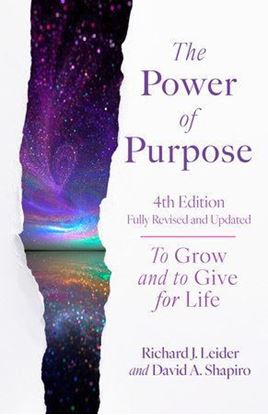

THE POWER OF PURPOSE, 4TH EDITION
Purpose is an active expression of our values and our compassion for others—it makes us want to get up in the morning and add value to the world. The Power of Purpose details a graceful, practical, and ultimately spiritual process for making it central to your life. This revitalized guide will help you integrate it into everything you do.
This fourth edition has been completely revised and updated. With a new co-author, new stories and examples and resources, it taps into the broader need for purpose in our post-pandemic world. With more than 40% new content, readers will discover new insights on purpose, a new chapter on Becoming a Purposeful Leader, and The Purpose Formula which includes mind-opening questions to help you unlock your purpose and to live a life of meaning and fulfillment.
1,500
MUJERCITAS (TD)
El señor March ha tenido que marcharse a la guerra y sus hijas se han quedado con su madre, su tía y sus amigos, durante un invierno en el que tendrán que aprender muchas cosas. Meg, Beth, Amy y Jo, las cuatro hermanas March, tienen intereses muy distintos, pero tratan de convivir lo mejor posible y afrontar los cambios que supone crecer y hacerse un lugar en el mundo. Y más siendo mujeres.
1,500
CUENTOS INQUIETANTES
Los «Cuentos inquietantes» aquí reunidos, la mayoría de los cuales han permanecido inéditos en castellano hasta hoy, lo son cada uno a su manera. Algunos se escoran levemente hacia lo sobrenatural, en la línea de los relatos de fantasmas de Henry James, historias en las que el elemento ultraterreno sobrevuela la cotidianidad de modo casi imperceptible: sutilmente invasivo, tan evanescente en ocasiones que la duda atenaza al lector hasta el final provocándole una deliciosa inquietud.
1,500
EXTRAÑA CONFESION
Extraña confesión apareció en folletines populares en 1884 y 1885. Es la primera novela larga publicada por Antón Chéjov y la única policíaca que escribió el gran autor ruso. Un editor recibe del autor, un manuscrito donde se narra en primera persona la experiencia de un juez de instrucción que sirvió en su juventud en un remoto distrito ruso. El libro resulta ser una novela inspirada en un crimen pasional ocurrido en esa localidad y en cuyo proceso tuvo protagonismo el referido juez. Mediante el análisis del texto, el editor se da cuenta de que el crimen sigue impune, que la persona que acabó siendo condenada es inocente y que los hechos no ocurrieron tal y como los cuenta el autor del relato.
1,500
BRAN MAK MORN
Entre todos los héroes salvajes y brutales inventados por el creador de Conan, Robert E. Howard, el rey picto Bran Mak Morn guarda un origen más próximo a la historia. Se debe a la ascendencia escocesa-irlandesa de este autor, discípulo y amigo de Lovecraft, y principal impulsor del género de «espada y brujería». Considerado junto a Tolkien uno de los escritores más influyentes de la fantasía heroica moderna, Howard narra en estas aventuras la encarnizada lucha que, capitaneados por su último rey, sostuvieron los pictos britanos a finales del siglo III de la era cristiana contra las legiones de Roma. Cuenta la épica de una raza que avanza inexorablemente hacia su extinción, mientras intenta detener el rastro de muerte que dejan a su paso las águilas romanas.
1,500
DAISY MILLER
El enfrentamiento entre el refinado y seductor Viejo Mundo, aunque cínico, corrupto y desgastado, y el vitalismo ingenuo pero basto de la riqueza del Nuevo Mundo fue uno de los temas recurrentes de Henry James. El contraste entre ambas culturas, la norteamericana y la europea, le proporcionó el material para novelas como Roderick Hudson (1875), El americano (1877), Los europeos (1878) y esta Daisy Miller (1878).
La historia comienza con el encuentro de dos norteamericanos en un hotel de la rígida y puritana Ginebra: un diletante que parece no decidirse por nada, expatriado en Europa, y una espontánea, coqueta y rústica heredera en viaje "cultural" con su familia. Ambos se sienten atraídos pero el joven Winterbourne reprime su interés ante el prejuicio de sus parientes y amistades por pertenecer Daisy a "la clase de norteamericanos que tenemos el deber de no aceptar". Se da la voz de alarma entre el arribista círculo social de norteamericanos establecidos en Europa y, por su indecisión, Winterbourne es también arrastrado a la implacable respuesta de esta moral colectiva que rechaza a Daisy Miller.
1,500














